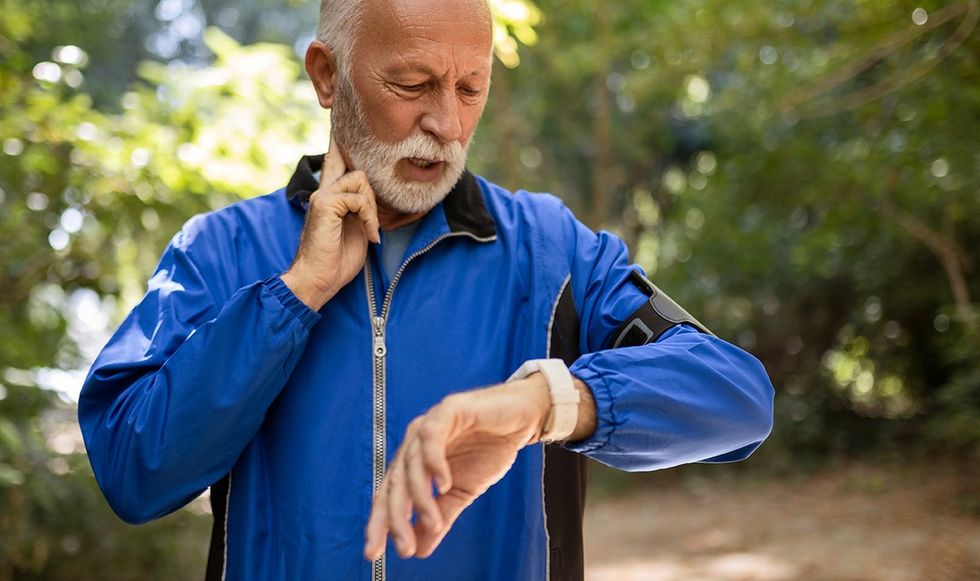GBN Health Check: When will you die? Meet the scientists who are calculating your time of death
Longevity researchers are getting ever more granular in their predictions of mortality
In this week's GB News Health Check, our digital health editor Adam Chapman delves into the science of predicting mortality and what this means for how we live our lives
Don't Miss
Most Read
Trending on GB News
If you could see into the future, would it change how you live in the present?
Obvious as the answer may seem, drawing lessons from the future has long appealed to the popular imagination.
Charles Dickens' timeless classic A Christmas Carol springs to mind.
Ebenezer Scrooge, a mean-spirited and miserly old man, is visited by the Ghost of Christmas Future.
Scrooge is shown the gloomy fate that awaits him if he does not change his ways.
Dickens was clearly making a moral point but fast forward to the 21st Century and predicting the future has become a core scientific objective.
Armed with a prodigious amount of data and cutting-edge technology, researchers are trying to pinpoint exactly when a person might die.
Getting to this ground truth has enormous implications for both the individual and society as people are living longer than ever before.
By 2050, the world’s population of people aged 60 years and older will double to 2.1 billion. The number of persons aged 80 years or older is expected to triple between 2020 and 2050 to reach 426 million.
Taking up the gauntlet
Kari Stefansson, CEO of deCODE genetics, started thinking seriously about this question around the year 2000.
DeCODE genetics, a subsidary of Amgen, published a paper in the European Journal of Human Genetics, examining whether or not longevity is inherited.
"We basically studied everyone in Iceland over the past few generations because we have the genealogy of the entire nation on a computer database. We have the date of birth and date of death of everyone," the 75-year-old neurologist told GB News.
Stefansson and his colleagues then looked at everyone in the country over the age of 90 and asked the question: "Are they more related to each other than a very large number of control groups?"
The answer turned out be a resounding yes: no matter what method they used, they turned out to be more or less related to each other than random collections of people.
And since they were looking at the whole nation over many generations, Stefansson and his team concluded that there is a genetic component to longevity.
He then attempted to work out how the gene was inherited, asking the question: "Is it that these people are ducking the disease genes, or are they inheriting a positive attribute?"
If the answer was due to the ducking of the disease genes, the inheritability would have been very complex, Stefansson explains.
Why? Because there are so many disease genes. But if you inherit a single positive asset, that could be very simple to track through the generations, he says.
This seemed to be the case: in each family there appeared to be a simple genetic pattern, probably a single gene, that was conducive to longevity.

A study of the population of Iceland suggests there is a genetic component to longevity
Getty Images
The next inevitable question was: "If you are so lucky to inherit the longevity asset, when does it kick in?"
Stefansson found it was "basically" at the age of 67. He added: "If one of your parents reaches more than 90 years of age, your probability of dying within the next year is statistically significantly less than if both of your parents died before the age of 90."
The epidemiological study, published in Communications Biology, animated the neurologist and his colleagues, and they have been "relentless" in their pursuit to identify a longevity gene ever since.
A specific longevity gene has eluded the DeCODE team thus far but they have made significant strides in related areas.
As part of their research, they have found everything that affects longevity also affects other phenotypes.
A phenotype is a person's set of observable traits, such as height, eye colour and blood type, that are determined by both their genomic makeup (genotype) and environmental factors.
The team found that behavioural phenotypes, such as educational attainment, smoking and socio-economic status, also influence a person's longevity.
"In many ways, this shouldn't come as a surprise, because we exist at this interface between genes and environment," explained Stefansson.
He continued: "And the older you are, the more opportunity the environment has to influence you so it isn't surprising that how you behave over the first 90 years of your life has an impact on your probability of living another ten years."
Using a dataset of over 5,000 protein measurements in 22,913 Icelanders, of whom 7,061 died during the study period, the scientists developed a predictor of the time of death that can outperform predictors based on multiple known risk factors.
The predictor can identify the five percent at highest risk in a group of 60 to 80 year olds, where 88 per cent died within ten years and the five percent at lowest risk where only one percent died within ten years.
The scientists explored how individual proteins map onto mortality and various causes of death and found most causes of death to have similar protein profiles.
In particular, they found growth/differentiation factor 15 (GDF15), which has been associated with mortality and ageing before, to be an important predictor of all-cause mortality.
Furthermore, they found that, on average, participants predicted at high risk of death within a short period of time had less grip strength and performed worse on an exercise tolerance test and a test of cognitive function than those predicted at lower risk.
"The predictor gives a good estimate of general health from a single blood draw," said Thjodbjorg Eiriksdottir, scientist at deCODE genetics and author of the paper.
"This is pretty cool but also scary and hopefully somewhat useful," Stefansson said of the findings.
"This shows that our general health is reflected in the plasma proteome. Using just one blood sample per person you can easily compare large groups in a standardised way, for example, to estimate treatment effects in clinical trials."
A taste for blood
Raghav Sehgal, a PhD student at Yale University, is doing similar work in the field.
He is currently developing an epigenetic model that's based on ageing biomarkers to accurately predict your time of death and biological age.
An epigenetic ageing biomarker called Systems Age that he has developed alongside Doctor Morgan Levine, a former professor of Yale, can predict ageing in 11 different organs of your body from a single blood draw using epigenetic data.
Epigenetics is the study of how our genes express themselves, and how this is impacted by external factors.
As Sehgal explains, epigenetic biomarkers require just a single dry blood drop and can tell the biological age not just of your whole body but of specific organs like heart, kidney, lung, brain, musculoskeletal and more.
"Epigenetic clocks like the ones I have built have been shown to be highly reliable: they repeatedly give the same biological age result down to months, even days," he claimed.
That being said, the Yale researcher admits some recent research has shown that epigenetic clocks could suffer from variations due to changes in sleep cycle and immune cell variation causing changes in the output of the ages they are predicting for the individual being tested.
"This is all to say that from the perspective of epigenetic ageing tests and biomarkers that predict how long a person might live or predict their biological age, the field is still nascent and we are still in need for more validation," he told GB News.
And even though at the population level these biomarkers show great potential and statistics, at an individual level there is still much more work to be done, Sehgal acknowledges.
LATEST DEVELOPMENTS

Epigenetic biomarkers require just a single dry blood drop and can tell the biological age of your body
Getty Images
Nothing comes for free
There is a financial incentive to close this gap and produce ever accurate estimations of a person's life expectancy.
Dale Hall, Managing Director of Research at the Society of Actuaries (SOA), looks at mortality data to put a price on risk and uncertainty.
"We look at distributions of longevity regularly for life insurance, pension, retirement plans and annuities," he told GB News.
The SOA has focussed on all-manner of contingencies surrounding longevity and mortality since its inception 75 years ago.
"We also look at mortality population because everyone who is in the insured population is a subset of everyone in the general population so there's an importance in studying what happens in the general population as this will filter its way down to what's happening in the general population," Hall explained.
As part of that, the MD looks at what are the specific trends for the causes of death in the population.
Is heart disease or diabetes going up or down in the general population? They then price risk based on these wider trends.
The company also look at population mortality through a "socio-economic lens".
Take the 350 million people living in the US as an example, the SOA will divide the population into ten deciles based on socio-economist variables such as income, education and access to healthcare, then study what happens across these ten deciles.
The company has also developed what it calls the 'Longevity illustrator'. This is a tool that looks at the distribution of life expectancy across the population.
In addition to collecting general population mortality data, it asks users a couple of general health questions, such as whether they smoke or not.
The robot will see you now
Artificial intelligence has huge promise in this space.
A quick scroll on the internet brings up an impressive array of AI-powered life expectancy calculators.
One of these tools was the subject of a recent study led by Sune Lehmann, a network and complexity scientist at the Technical University of Denmark.
“We use the technology behind ChatGPT (something called transformer models) to analyse human lives by representing each person as the sequence of events that happens in their life,” explained Professor Lehmann.
In the report, published in the journal Nature Computational Science, the professor of network and complex systems from the Technical University of Denmark, and co-authors introduce an algorithm known as 'life2vec', which uses select details of an individual’s life — including income, profession, residence and health history — to determine life expectancy with 78 per cent accuracy.
They fed the AI tool data between 2008 and 2015 from a subset of six million Danish people, aged between 35 and 65 to make predictions about whether they would likely live for at least four years beyond January 1, 2016.
The researchers then checked these predictions against the subjects' actual outcomes, recorded between 2016 and 2020, and the results proved eerily accurate.

Mortality data is used to put a price on risk and uncertainty
Getty Images
Computer says no
Not everyone is wowed by AI.
"AI is just a collection of methods. They're going to make us better at finding complex patterns faster but this belief that AI is going to revolutionise our lives and even take over our life is simplistic," Stefansson of deCODE genetics told GB News.
He likens AI to a "screwdriver", adding: "It's just an instrument. It's a very effective instrument in the right hands but we also have to be careful in the way in which we apply it."
And finding a useful application for the sheer volume of data it throws up will be a herculean task, he predicts.
The data itself may set it up to fail, opines Yale University's Sehgal.
"When building a machine learning model we need a ground truth, something that is absolutely true. Unfortunately for ageing, there is no such ground truth. You may say your chronological age or number of birthdays you have had is the ground truth but in reality, that is not a very good predictor of your true biological age or how many years you have left to die," he said.
Hall of SOA is also ambivalent: "AI is enabling a deeper look at data that can be used make estimates about longevity and mortality. But I don't think it is necessarily having a day-to-day force.
"It's a powerful tool for analysis but I don't think it will be able to give a better, more individualistic illustration of person's lifespan."
Freedom or fatalism?
Puting the pros and cons of AI to one side, all experts agreee that better predicting mortality is a net positive.
Far from being an "Orwellian instrument", it allows you to take specific interventions to maximise what is left of your life, Stefansson says.
And we have an "incredible opportunity to influence our fate by controlling our environment", he added.
One way of doing this is through exercise. Regular exercise seems to slow down the ageing of the brain, Stefansson notes.
A long-term study published in the Journal of Neurology Neurosurgery & Psychiatry found any regular physical activity at any age is linked to better brain function.
"This important because it puts a little bit of your fate into your own hands," the deCODE genetics CEO said.

Regular exercise slows down the ageing of the brain, research suggests
Getty Images
A recent study provided one of the clearest illustrations yet that you can overide your genetics by leading a healthy lifestle.
Regular exercise, never smoking, following a healthy diet and getting enough sleep added an extra five years to the lives of people who were genetically predisposed to a shorter life.
The findings showed that the genetic risk of a shorter lifespan or premature death might be offset by a favourable lifestyle by around 62 per cent.
Certain dietary approaches are proving to be remarkably adept at reducing the epigenetic biomarkers that accelerate ageing, Sehgal of Yale University says.
The PhD student has looked at four different diets: fat-free, low-carb, Mediterranean and vegan, and "across the board the answer is consistent, pick any diet and you will see a reduction in these epigenetic biomarkers - to different extents of course but nevertheless you will see a reduction".
Various studies have pointed to the longevity benefits of a diet focused on plant foods like fruit, vegetables, wholegrains, nuts and seeds, and that's moderate on lean proteins and low on red and processed meats.
The MIND diet, which combines elements of the Mediterranean diet and the Dietary Approaches to Stop Hypertension (DASH) diet, was recently shown to slow down biological ageing and reduce the risk of dementia.
It is commonly said that "we are here for a good time not a long time" - but what if it's possible to be both?








